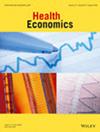The Impact of Social Health Insurance on Student Performance: Evidence From an RDD in Peru
IF 2.4
3区 医学
Q2 ECONOMICS
引用次数: 0
Abstract
The literature on the effects of social health insurance focuses on its stated goals, which are health status and financial protection. In contrast, we examine the effect of the Peruvian program on student performance using a sharp RDD. We use a unique individual-level database built from the merger of household survey data and standardized test scores from a national census. We find that social health insurance has large effects on mathematics and reading comprehension scores. The clearest mechanism is a lower incidence of anemia among children and family members.
社会健康保险对学生表现的影响:来自秘鲁RDD的证据。
关于社会健康保险影响的文献侧重于其规定的目标,即健康状况和财务保护。相比之下,我们使用锐利的RDD来检验秘鲁项目对学生表现的影响。我们使用了一个独特的个人层面数据库,该数据库是由住户调查数据和全国人口普查的标准化考试成绩合并而成的。我们发现社会健康保险对数学和阅读理解成绩有很大的影响。最明显的机制是儿童和家庭成员的贫血发生率较低。
本文章由计算机程序翻译,如有差异,请以英文原文为准。
求助全文
约1分钟内获得全文
求助全文
来源期刊

Health economics
医学-卫生保健
CiteScore
3.60
自引率
4.80%
发文量
177
审稿时长
4-8 weeks
期刊介绍:
This Journal publishes articles on all aspects of health economics: theoretical contributions, empirical studies and analyses of health policy from the economic perspective. Its scope includes the determinants of health and its definition and valuation, as well as the demand for and supply of health care; planning and market mechanisms; micro-economic evaluation of individual procedures and treatments; and evaluation of the performance of health care systems.
Contributions should typically be original and innovative. As a rule, the Journal does not include routine applications of cost-effectiveness analysis, discrete choice experiments and costing analyses.
Editorials are regular features, these should be concise and topical. Occasionally commissioned reviews are published and special issues bring together contributions on a single topic. Health Economics Letters facilitate rapid exchange of views on topical issues. Contributions related to problems in both developed and developing countries are welcome.
 求助内容:
求助内容: 应助结果提醒方式:
应助结果提醒方式:


